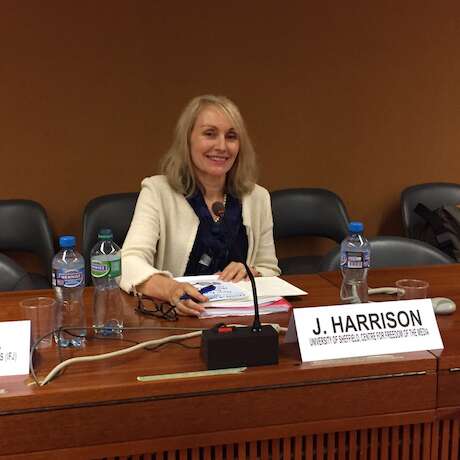Hostility toward media freedom is brutally direct, pernicious and insidious. Assaults on journalism weaken the capacity to hold power to account, pursue informed decision-making, or to build communities based on shared values and facts. As part of an international stakeholder community, this UNESCO Chair works to implement the 2012 UN Plan of Action on the Safety of Journalists and the Issue of Impunity in order to secure a free & safe environment for journalists and greater justice for crimes against them.
The work of this Chair
Led by Professor Jackie Harrison, the UNESCO Chair on Media Freedom, Journalism Safety and the Issue of Impunity team undertakes a range of research and education projects to raise awareness, knowledge and understanding of assaults on media freedom.
The interdisciplinary research focusses on improving the monitoring of attacks on journalists and analyses the use and misuse of law within national and international contexts and the corresponding lack of redress for victims. This research also evaluates the increasing complexity of restrictions placed on journalism, the use of both lethal and non-lethal threats, and the ever expanding range of online and offline intimidation of news media around the world.
Using this research, the Chair also works to raise public awareness and to influence policy debates and policy makers with regard to freedom of expression, public access to trustworthy and accurate information, and the risks to journalism safety by those who seek to reject scrutiny of their actions by silencing dissenting voices.
The UNESCO Chair acts as bridgehead between academia, civil society organisations and other international agencies and is actively engaged in the production of high-quality research, network building and education that contributes to the sustainable development and promotion of free and independent news media worldwide.
About the Chair Lead

Jackie Harrison is Professor of Public Communication, UNESCO Chair on Media Freedom, Journalism Safety and the Issue of Impunity and co-founder and Chair of the Centre for Freedom of the Media (CFOM) at the University of Sheffield, UK. She has published on the civil power of the news; media regulation and freedom of expression, the role of the news media in civil norm building and the development of factual media civil capacity building in post-conflict contexts.
She has co-researched new methodologies for the monitoring of attacks on journalists. Currently she is working on the civil power of journalism within the global newscape. Her collaborative work has led to the delivery of policy and practice reports and the development of an international academic community focussed on journalism safety. She has advised a range of international and national bodies and media regulators and is a Fellow of the Academy of Social Sciences.






